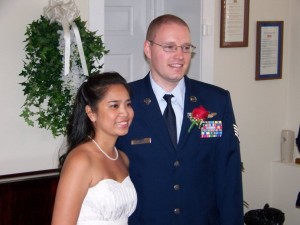
Nate Roberts and wife, Daisy, 2009.
“I'm just trying to be a father, raise a daughter and a son, be a lover to their mother, everything to everyone…yeah, I'm real good under pressure being all that I can be…I just work straight through the holidays, and sometimes all night long…'cause freedom don't come free.. I'm an American, an American Soldier.” — Toby Keith, excerpts from his song, “American Soldier.”
When the soldier receives his or her orders for going to war, this not only impacts the warrior, but also, the family. As a military spouse, the partner must prepare for being apart from his or her soldier for long periods of time. If the couple has children, care must be taken to ensure the family understands that “daddy” or “mommy” is coming back home after war.
Quite often, it is more up to spouse of the deployed, than anyone else in the family, as to how well the family unit will adjust during the soldier's deployment period. It is vital for the soldier to believe he or she has 100% trust and support from their spouse (assuming he or she is married) before, during, and after deployment.
The following are four suggestions for the spouse to make the complete deployment easier for the soldier and the family:
(1). Maintain the same routines (in life, at home, work, or school) before, during, and after deployment as closely as possible. This is what your soldier is used to, your children are used to, and this provides the soldier comfort knowing all is status quo.
(2). Once the soldier has deployed, join a support group with others, reach out to family members or trusted friends, and just talk about your feelings. There will be some difficult days, but always know people care.
(3). Keep your cell phone on 24/7. There are times the soldier stands in a line and waits three hours just to hear your voice. Things we take for granted every day, are important to a soldier who has a spouse. Keep yourself available for those calls, Skype, and the internet as often as possible. What he or she wants to hear from you are normal, everyday activities. This is comforting to the one who is at war.
(4). Make no major life changes and by no means, vacant the deployment post. The soldier needs to know their spouse is waiting for them during R&R. Again, the soldier needs to be assured the family is right there waiting his or her return.
When the soldier returns from war, there will be an adjustment period for the entire family. If the soldier is married, the spouse has had to maintain the household during the entire deployment period. This has become the norm. The following are four suggestions for a smooth transition for families when the soldier returns from war:
(1). Understand it may take time for sharing of household duties, such as bill-paying, putting children to bed, preparing dinner, and simple things, such as grocery shopping. Your soldier has been fighting a war and has not been doing any of these “normal” things.
(2). Psychologically, your soldier may need counseling or therapy. Your family may also need help in recognizing some of the symptoms from battling in war so you can help cope with your loved one. Furthermore, the family members may need support, either through reading, therapy, or talking with the VA, about how to handle the issues that may arise from their soldier who has endured war and come back home. There are things that should be said and things that should never be said to a warrior, even when that person is your spouse. Education is the key.
(3). Give the soldier space. There is no set time limit on how soon a soldier can reintegrate back into a normal everyday routine, even at home. Your partner may want to make love with you every night for two weeks straight, and then not want intimacy for the next month. Try to remember there may be flashbacks, or numbing, especially if they have been in active combat zones, and what used to be “normal” for you as a couple or family, may take time to be “normal” once again.
(4). Possibly, the most difficult adjustment for the family when the soldier returns from war is the social aspect. If your family is used to attending church services every Sunday, the soldier may not wish to go immediately. If the company you work for is hosting a large company party, your soldier might not want to attend that. If it is normal for you to go to the mall with your children, this may make the soldier uncomfortable, especially if there are crowds. Even going to a bowling alley, movie theater, or things we consider to be “normal” may make your soldier feel uncomfortable at first. Please remember to give your partner some time to readjust to social settings. The soldier is trained to scan people in crowds, look for differences, and notice what we would never notice. The social aspect of reintegration back into society is one many would rarely think of.
I personally, have never been a military spouse or even been in the military. Nonetheless, I have counseled many military wives and numerous soldiers and understand the conflicts faced during war. War is war. There is no need for the home to be a battlefield, also.
With these suggestions, a lot of love, and a little bit of work, the families not only can survive the consequences of war, they can become a more closely knit entity than they were before. It does take work, but who ever said being in the military was easy?
Please feel free to contribute your thoughts to this blog. I appreciate your input!
©Copyright — Gayle Joplin Hall, PhD. All rights reserved worldwide. None of this material may be downloaded or reproduced without written permission from the author.















War affects each individual differently and may also affect each family in a unique way. My article is based on studies of over 95% of soldiers returning from war. Please leave your comments and suggestions on this topic and be sure to read the previous two blogs written about soldiers and PTSD.
I welcome your ideas for future blog posts.
Shining my love into your world, Dr. Gayle J. Hall
Hey Gayle,
As one that ran MWR’s (Moral, Welfare and Recreation)Center’s for the soldier’s in Iraq, I vividly remember our guy’s and girl’s patiently waiting to make their 20 minute phone call or use the computer to simply check their email. The memory really brings me to tears!!! There were many times that I’d invite a stressed young warrior into my office to use my phone to manage family their affairs quietly.
As a child, I watched my mom manage our family affairs while my dad deployed to Vietnam twice and I remember those family talks before he left. I had them with my wife and two children before I left!!!
Wow, what a flood of emotions this brings back!!!
Thank you,
Bennie
Dear Bennie: You made a comment on the previous article/blog regarding your service as a Marine and your father’s 22 years of service in the Army. Now, after reading this comment you posted to my article, I can say you have seen it all from every aspect.
Thank you for stressing the importance of that phone call from the soldier. I have had some tell me they have waited as long as three hours in the line just to make a call. All they want to hear is a voice from home. I appreciate hearing first-hand from one who knows how meaningful this is to the soldier who is in a war zone. Perhaps those reading this article will understand now also, why it is critical to make yourself available as much as possible to your soldier. Naturally, there will be times the cell phone cannot be turned on, but it can always be on vibrate. Never again, will anyone close to me be at war and NOT be able to reach me – for any reason.
Bennie, your candor in disclosing your “flood of emotions” is brutally honest. I see you as being a man of valor. Your family is blessed to have you as the head of their household.
Thank you so much for sharing and educating others here today.
God bless you.
Shining my love your way, Dr. Gayle J. Hall